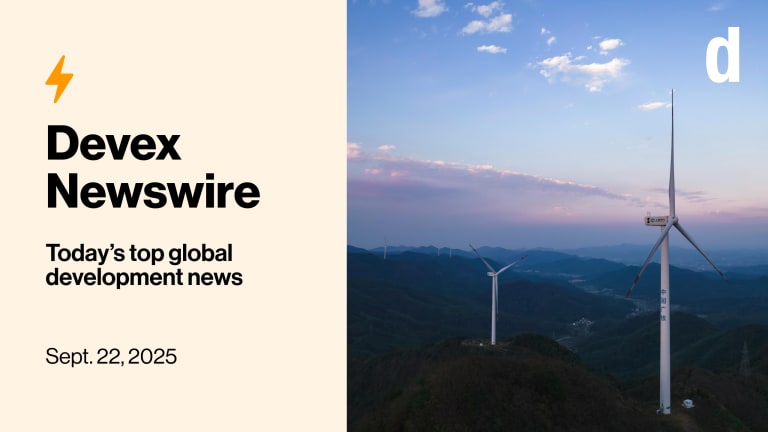
This is a preview of Newswire
Sign up to this newsletter for an inside look at the biggest stories in global development, in your inbox daily.
Two key climate events are taking place this week, with participants in each hoping for a way forward on climate finance — a cornerstone of building trust with lower-income countries and allowing the globe as a whole to adapt and respond to climate change.
Climate finance is proving a key challenge to productive climate negotiations needed to stage a successful COP 26 summit scheduled for November.
• V20: Sheikh Hasina, the prime minister of Bangladesh, told the virtual V20 meeting of climate vulnerable nations Thursday that high-income countries have a “historic responsibility and moral and legal obligation” to lower-income countries. Alok Sharma, the United Kingdom’s COP 26 president, agreed and said that delivering finance was a “matter of trust.” Criticism of the incomplete delivery of a promised $100 billion in climate finance from high-income countries due last year was a major sticking point, Anca Gurzu reports for Devex.
• G-20: Hot on the heels of the V20, the G-20 will meet in Venice on Sunday to discuss how to finance the fight against climate change — and the damage it is already causing. After a disappointing G-7 for climate campaigners, who said the richest countries’ climate pledges mostly fell short, heightened importance is now being placed on the G-20 summit. Andrew Green has a rundown on what to expect.
Read: Climate-vulnerable nations demand urgent boost for delayed funds
Find out more: What to expect at the G-20's Venice conference on climate
Over the borderline
The deadline is looming for the U.N. Security Council to reauthorize the last cross-border aid delivery operation in northern Syria. The one-year Security Council resolution expires on Saturday — threatening the “safest and most reliable way of getting aid to people” in northern Syria from Turkey, according to Mark Cutts, U.N. deputy regional humanitarian coordinator for the Syria crisis.
The Security Council vote is set for today. But the continued passage for aid in Syria is far from guaranteed.
• Early this week, Russia skipped U.N. talks on the resolution, which would extend aid for one year through the Bab al-Hawa crossing.
• An estimated 13.4 million Syrians needed humanitarian assistance as of early 2021.
• Failure to reauthorize the resolution and aid crossing would “disrupt lifesaving aid to 3.4 million people in need across the northwest,” Ramesh Rajasingham, U.N. humanitarian chief, reportedly told the Security Council in late June.
• The EU commissioner for crisis management and the U.S. ambassador to the U.N. were among those who called yesterday for the resolution to be renewed.
• The U.N. country team in Syria, meanwhile, has pledged to not “abandon” Syrians, “whatever happens.”
ICYMI: Check out our in-depth coverage of this issue in April.
Nordic connection
Finland is reorienting its development policy. It has long focused on gender, education, and climate, but now the country of saunas and Nokia is embracing the digital age — a bit late, much like their famous mobile phones. But, while Finland’s adoption of digitalization and connectivity in its development strategy is trendy, is it what lower-income countries actually want or need? Adva Saldinger sits down with Ville Skinnari, Finland’s minister for development cooperation and foreign trade, to find out.
Devex Pro: Q&A: Finland's new focus on digitalization in development
African outlier
Nigeria seems to have averted the third wave of COVID-19, which much of Africa is currently battling. “We have kept the outbreak numbers low. We have tested consistently … and the hospital system has held up,” Dr. Chikwe Ihekweazu, director general of the Nigeria Centre for Disease Control, tells Devex. “And all these have been driven by Nigerians, not foreign experts.”
Many credit that to Ihekweazu’s leadership — he advocated for the creation of a well-resourced national center for infectious disease prevention and control in a 2010 blog post and within six years was appointed to run it — but he’s quick to share the kudos with the hundreds of others also coordinating Nigeria’s pandemic response.
Read: Leading the fight against COVID-19 in Africa's most populous country
In other news
The death toll from famine has outpaced that of COVID-19, with 11 people now dying of hunger per minute around the world, according to an Oxfam report. [AP]
Lebanon’s acting prime minister, Hassan Diab, called on “kings, princes, presidents” as well as the United Nations to “rescue” the country from its current economic crisis. [The Economist]
UNICEF has inked a deal with the African Union to deliver 220 million Johnson & Johnson COVID-19 vaccine doses to its member states by 2022. [VOA]
Sign up to Newswire for an inside look at the biggest stories in global development.
Search for articles
Most Read
- 1
- 2
- 3
- 4
- 5









